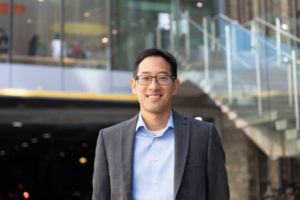
When Professor Timothy Chan (MIE) thinks about his impact as an industrial engineering teacher, he is proud of consistently getting his students excited about the material, whether it is optimization, analytics or operations research.
“The courses I have taught have long histories with broad applications,” he says. “I try to teach students the fundamentals and motivate them to study the topics further so they can gain the practical skills to apply what they have learned in their subsequent work or research.”
In the past, he has found creative ways to motivate his students, including designing a software game modelled after the game show Deal or No Deal. Learning classroom concepts through play allowed his students to become enthusiastic about topics such as probability, expected values and decision making under uncertainty.
“My students would get hyped up and competitive. For many of them, it was the first time they were able to apply these concepts in real life,” says Chan, who holds the Canada Research Chair in Novel Optimization and Analytics in Health.
“It was rewarding to see them so engaged and driven by their course work.”
This commitment to teaching and mentorship has earned Chan a 2024 U of T President’s Teaching Award. This is the highest honour for teaching at the University of Toronto, as the award recognizes faculty members who demonstrate a substantial commitment to teaching innovation and excellence.
“I like to teach the way I would want to be taught myself,” he says. “I remember taking many theoretical math courses during my undergraduate studies in applied mathematics where the topics could be a bit dry since we could not see the real-world application of the work we were doing.
“But I had some great professors who made the course work memorable by injecting humour and showing their passion for what they were teaching. That helped me fall in love with that type of work.”
As a mentor, Chan aims to help students achieve their career goals after graduation, whether it is guiding undergraduates through research or helping PhD students secure faculty or industry positions.
“I am very proud of my track record, which includes having many of my former PhD students, teaching assistants and postdoctoral fellows attain faculty positions at universities around the world,” says Chan.
One of these former students is Christopher Sun (EngSci 1T3 + PEY, MIE PhD 1T9), a professor at the University of Ottawa Telfer School of Management and a scientist at the University of Ottawa Heart Institute.
“Professor Chan’s mentorship was a transformative experience that extended beyond the classroom,” says Sun, who holds the Canada Research Chair in Data Analytics for Health Systems Transformation.
“His creative approach to motivating students from diverse backgrounds, coupled with his exceptional work ethic and ability to connect theoretical intricacies with practical applications, has profoundly influenced me.
“His guidance in tackling complex challenges in health care was a cornerstone of my success during my graduate studies and continues to inspire me to this day. His dedication to his students, myself included, and his efforts to build a community of lifelong learners are truly remarkable.”
When Professor Janet Lam (MIE) was a teaching assistant (TA) for one of Chan’s courses, one of the most impactful parts of her experience was the weekly teaching team meeting, which was administrative but ensured that the tutorials and lectures were synchronized.
“Professor Chan used these team meetings to model teaching excellence: he explained his rationale in pedagogical decisions and coached us graduate students to become excellent educators in our own rights,” says Lam, who is now a teaching-stream professor in the Department of Mechanical & Industrial Engineering.
“By leveraging the creativity of the graduate students, a robust body of teaching content was generated, and the TAs got a true sense of ownership in the course.”
Chan’s impact is now experienced by a new generation, says Lam, as she teaches her own courses and mirrors many of the strategies he used when they worked together.
“I also meet with my TAs and give my own rationale for my pedagogical choices, encouraging them to think critically about their teaching philosophies,” she says.
“I still reflect on the time we worked together, now transitioning my strategies to become a better coach of the next generation of educators, beyond classroom excellence.”
While Chan’s administrative role as U of T’s associate vice-president and vice-provost, strategic initiatives, and his focus on the research conducted in his Applied Optimization Lab, has reduced his teaching schedule, he continues to be active in mentoring undergraduate and graduate students. He is also presently writing a book on the Markov decision process that will be used as a teaching resource.
“If you look at all the past winners of the U of T President’s Teaching Award, there have been so many tremendous teachers and mentors at the university who’ve been recognized, I’m very proud to be among this group,” he says.
“It’s also very gratifying to know that my teaching has made an impact on the lives of the students I’ve taught and mentored.”
“Professor Chan is not only an internationally revered researcher, challenging complex decision-making problems that advance healthy societies — his impact also extends across our university, through his tremendous leadership of the cross-divisional, tri-campus Institutional Strategic Initiatives portfolio,” says Christopher Yip, Dean of U of T Engineering.
“His impact as a teacher is one more way that he is inspiring the next generation of engineering leaders to drive innovation and redefine our field.
“On behalf of the entire faculty, congratulations on this well-earned honour and induction into the President’s Teaching Academy.”
– This story was originally published on the University of Toronto’s Faculty of Applied Science and Engineering News Site on May 27, 2024, by Safa Jinje.